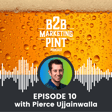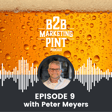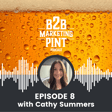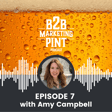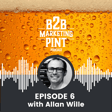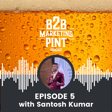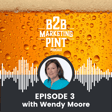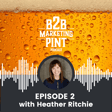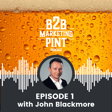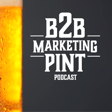Become a Creator today!Start creating today - Share your story with the world!
Start for free
00:00:00
00:00:01

🎙️Sales Therapy: Fixing the Founder-to-Funnel Gap
📄Is your founder-led sales approach hitting a wall? You're not alone. In this episode of B2B Marketing Pint, Brian and Brendan sit down with Craig Heward—founder of the Sales Mentor Collective—to explore the often messy transition from founder-led sales to a scalable, repeatable revenue engine.
Expect candid conversation (and a few cold ones) as we unpack:
- Why most founders wait too long to hire real sales help
- How to spot whether you need a hunter, closer, or something in between
- What you must write down before scaling sales (spoiler: it’s more than you think)
- How to stop the finger-pointing between marketing and sales
- Plus, Craig’s take on the biggest myth about salespeople
Grab a pint and join us for some revenue therapy. Because scaling sales isn't magic—it's process, patience, and a pint of honesty.
Transcript
Intro
Introduction to the Podcast and Guest
00:00:26
Brian O'Grady
You have joined a new episode of B2B Marketing Pint. I'm Brian O'Grady. One of the fellows on your screen with a lighter shirt is Brendan. And I'm really more curious about the fellow in the darker blue shirt. And I think, Brendan, I would welcome it if you would introduce us to him right now.
00:00:45
Brendan Ziolo
Hi everyone and yes, I am Brendan and joining us today is Craig Heward. He, not surprisingly for those of you that know me, Craig and I met in a bar.
00:00:57
Craig Heward
Thank you.
00:00:58
Brendan Ziolo
I could end the podcast there and just let all your imaginations run wild, but yeah it's probably not helpful from a marketing perspective. So Craig and I met at an industry event, pre-event party or whatever they called it a couple years ago and hit it off, have a lot of similar thoughts on the marketing front and how things should work.
00:01:19
Brendan Ziolo
But more importantly, Craig brings a very valuable sales perspective from his time as a sales professional with a number of companies, including startups and some more established companies as well.
Craig's Role and Work with Startups
00:01:32
Brendan Ziolo
Today, Craig is actually the founder of the Sales Mentor Collective, where he works with CEOs and founders and early stage companies to really help them go from, let's call it founder-led or early sales to a more established process. And that's what we thought would be super valuable to cover today.
00:01:51
Brendan Ziolo
But before we get started, according to to tradition, Brian, what are you drinking?
00:01:57
Brian O'Grady
That's an excellent question. And it's hard for me to imagine a better collection of guests to ask pithy marketing sales questions to and have a beverage with and you folks. Today, we we're checking out a breakaway IPA by a very local, very local brewery in my adoptive hometown of Guelph, Ontario.
00:02:16
Brian O'Grady
That's by Fixed Gear. They've got a bunch of goodies. This is, I think, the first one I brought to the podcast. And i'm I'll be excited between questions to be sipping on this with you folks.
Transitioning from Founder-led to Structured Sales
00:02:26
Brian O'Grady
Uh, Brendan, what do you got?
00:02:28
Brendan Ziolo
So I am once again carrying the non-alcohol banner for our podcast. I am drinking a Harman's. This has actually been on my list for quite some time. I can't remember who introduced me or suggested I try it, um but but finally got around to buying a couple. So super excited to try this one on our podcast today. It's the half day hazy IPA.
00:02:52
Brendan Ziolo
If anyone wants more specifics and, and for Harman's people,
00:02:54
Brian O'Grady
Very nice.
00:02:58
Brendan Ziolo
sponsor us.
00:03:00
Brian O'Grady
Thank
00:03:02
Brendan Ziolo
Sorry, was that subliminal enough? And Craig, what are you drinking on two more serious topics?
00:03:05
Craig Heward
Well, I was, yeah, that was the most perfect sales pitch I've ever seen, Brendan. So well done. um for having me. This is to great conversation. i'm really looking forward to it. I'm also looking forward to my beverage of choice, which is local here in Ottawa, Van Cleek Hill, Lug Tread,
00:03:25
Craig Heward
Just their typical Lagerdale great summertime sipper. It's one of my go-tos and has been for a number of years. So really excited to chat, learn, share, and have a beverage. Oh, I also have, of course, the matching glass.
00:03:43
Craig Heward
There you go.
00:03:43
Brendan Ziolo
Oh, nice.
00:03:44
Brian O'Grady
Brandon Glassware.
00:03:46
Craig Heward
So thanks.
00:03:47
Craig Heward
I bought this one, but Bose, if you want to send me some more, I'll completely promote you with some more.
00:03:47
Brendan Ziolo
Nice.
00:03:50
Brendan Ziolo
Yeah.
00:03:54
Brendan Ziolo
Yeah. And, and both it's, you know, first come first serve on the sponsorship. So I don't mean to just plug Harmon's here.
00:04:00
Brian O'Grady
Wow.
00:04:00
Craig Heward
Should breakaway on this as well, Brian?
00:04:01
Brendan Ziolo
think
00:04:02
Craig Heward
So we get a trifecta beer sponsors.
00:04:03
Brian O'Grady
Sure. yeah
00:04:05
Craig Heward
There
00:04:05
Brian O'Grady
Yeah. fix don' I'm sure FixGear will be ah chafing at the bit to be part of this.
00:04:09
Craig Heward
there you go. Don't leave us out.
00:04:10
Brendan Ziolo
Well, okay. Again, let's ahs let's do something more interesting to our marketing friends than try and plug our sponsorship opportunities. But cheers before we get started.
00:04:20
Craig Heward
Cheers.
00:04:20
Brian O'Grady
Right?
00:04:21
Brendan Ziolo
Brian Craig, looking forward to it.
00:04:21
Craig Heward
Remember, look each other in the eye as you cheers.
00:04:24
Brendan Ziolo
All right, so I'm going to get the ball rolling so I can drink and Craig can do all the talking. As I kind of mentioned at the start, what intrigued me when we when we've talked numerous times is that whole, you know, founder led sales is essentially the reality for a lot of startups.
00:04:40
Brendan Ziolo
at some point that doesn't scale. Not all founders are the best salespeople. So kind of when do you make that determination? You know, what's the right time to say, OK, we need to build out our sales organization. We need to scale, you know, kind of how do you make that decision? And then how long does it take? Because I'm going to assume it's not, you know, founder led sales today, full blown sales organization tomorrow.
Sales Roles and Hiring Timing
00:05:05
Craig Heward
Yeah, it's a good one because it it it certainly does change depending on where that founder is in their cycle of development. there's a number of different routes and different sales personalities that a founder could bring on board to help them with their process as well.
00:05:17
Brendan Ziolo
Thanks.
00:05:22
Craig Heward
So if you look at sales as a whole, i always find that there's two or three angles for sales. And, there's that, uh, grinder kind of get out there and find business, find conversations to have.
00:05:38
Craig Heward
There's the person who's probably a little bit more skilled at the back and forth and the, ah discovery side of it. There's the closer, there's the keep your people happy and the customer retention side of it. and And rarely do you find one person that can do all four of those jobs really well.
00:05:59
Craig Heward
it's it's probably good for a founder to understand where am i what do I need help with from a sales perspective order to move the revenue of our company?
00:06:10
Craig Heward
And if a founder is looking at themselves and saying, I don't have the time to go out and find business. I can have those conversations. I can move the business, but I don't have time to go out and find it. then Then maybe that that hunter to open up doors, develop some ah ah appointments, SDR, sales development rep role is the right first hire for them.
00:06:33
Craig Heward
essentially to fill my calendar with conversations with prospective clients. And then as a founder, you've got all the passion, you've got all the years of experience of talking to people about your product or service that you can go in there and and close the deal, et cetera, and move it forward.
00:06:52
Craig Heward
Now, if the founder wants to get really out of that process and and go back to R&D and improving the product, because maybe they're a tech person, maybe they're more involved in the the product that they're offering to the market and what it needs, and they want to get back into that piece because that's their passion and not the sales piece, then yeah, you probably need that middle person who can get in there and have really solid conversations with with the prospect.
00:07:18
Craig Heward
and try to understand what is it about my product or service that can solve some issues, that can help that business grow, that can help them achieve their issues. And that second level is probably somebody that you need at that point.
00:07:33
Craig Heward
Now, the ideal time to get in there and hire that person is going to be dependent on and everybody, but I think it's a capacity issue. And I think owners and founders and CEOs are sort of going to understand when they're going to be pulled in into direction of company growth that's required from an investment of people, investment in technology stacks, investment in R&D, and less on the revenue side.
00:08:00
Craig Heward
And that's when you really have to double down. And if you you can pass off the revenue to experts in the revenue field, you can continue on growing that company as a whole and develop the goals, the values, and the and the processes that go
Documenting Sales Processes
00:08:13
Craig Heward
along with it. So I think that would be If there's a point in time, whatever that looks like, that would probably be the big one is what does the CEO, what does the founder need to do next for the growth of the company and what can they hand off?
00:08:28
Brian O'Grady
That's pretty good. I already realized there's a lot I don't know about sales and i'm I'm realizing that maybe like a lot of people, I just group a lot of things under the heading sales without teasing out what those different dimensions are that you just described and different roles are under that greater heading.
00:08:40
Brendan Ziolo
Thank you.
00:08:43
Craig Heward
Yeah, yeah.
00:08:45
Brian O'Grady
So if it's not If it's not random, that means it's ordered and structured. And that brings the to mind something you said earlier in one of our pre-show briefings, which was you got to write stuff down. This is not just going to happen.
00:09:02
Brian O'Grady
What you need to be writing down? what What are these processes looking like? what's What's the first thing you should write down if you're getting started? How do you start a process driven sales function or sales organization?
00:09:15
Craig Heward
Yeah, Brian, I think that's what people skip over. They go in there. and is Some of the companies I speak with and some of the CEOs and leaders say, I'm just going to hire somebody and they're going to run with it and going great. He's a great salesperson.
00:09:29
Craig Heward
Okay, that's fine.
00:09:29
Brian O'Grady
When we're done. Yeah.
00:09:30
Craig Heward
But yeah, we're we're I mean, as great as salespeople are as a collective, we're we're not that. We're not miracle workers. We're not problem solvers instantaneously.
00:09:40
Brendan Ziolo
Thank you.
00:09:40
Craig Heward
It takes us time to ramp up and be really good at the craft. where you were an owner or a founder can really help or any company, you don't have to be in the startup scenario, but any company marketing team ownership, leadership, ELT, if you are really tight on who your first ideal customer profile is, that's going to help because that's going to streamline where's the salesperson seals to sales team members going to be shooting for that fish in the barrel.
00:10:09
Craig Heward
And if, If they have a very, very large barrel the size of the Atlantic Ocean, they're not going to hit.
00:10:17
Brendan Ziolo
Thank you.
00:10:17
Craig Heward
But if you can really narrow that focus down and say, I want you to talk to customer that looks and acts and talks and spends and buys exactly like this within this parameter, their chances of success of getting into the market and getting into the scenario is going to be successful is that much more faster, that much more faster.
00:10:39
Craig Heward
important and and and scalable. So nailing that and having that written down, we want we want to know who our customer is. And I know from a marketing perspective, you look at the same same type of thing. of Who are we going to focus on?
00:10:51
Craig Heward
Sales is no different. We need to know exactly who we want to draw in as an ideal client. From there, why does that client care to talk to you? So you need to know your unique value to the marketplace and have that written down and understand that The problems that I solve is this for my ideal client.
00:11:13
Craig Heward
And again, that becomes the the but constant communication. That becomes the messaging for the outreach, for the hallway conversations, for the initial discoveries.
00:11:25
Craig Heward
And as long as they can fit within
From Contact to Customer Onboarding
00:11:26
Brian O'Grady
Thank you.
00:11:26
Craig Heward
your package and you can help them with their problems, then again, you're setting your sales team up for for great success in that perspective.
00:11:33
Craig Heward
So those are two things from a customer focus that I think are really important.
00:11:34
Brendan Ziolo
Thank
00:11:38
Craig Heward
The third thing that's always not thought about is what does it look like when you open up a conversation with a customer to when you hand the customer off to your production team?
00:11:48
Craig Heward
whatever the product, whatever the service, you're going to have somebody that executes what you're selling. could be buying cars, selling cars. It could be SEO services. It could be content writing. It could be legal and justification.
00:12:02
Craig Heward
You need to know every step in that process from a sales perspective and have that written down.
00:12:02
Brian O'Grady
Thank
00:12:06
Craig Heward
I'm going to contact Brian on this date. I've contacted Brian 87 times over the last nine months, and I've logged all of those into some sort of a c crm These are the conversations that we've had.
00:12:20
Craig Heward
This is how I build my quote. This is how I adjust and edit my quote. This is how I send it. This is how we do our signature and e-signature and DocuSign.
00:12:28
Craig Heward
Have all of those processes set aside so that when they get into the sales conversation, that's one thing. and They get into discovery, that's another thing. and when they get into the executing, the yes.
00:12:28
Brendan Ziolo
you
00:12:40
Craig Heward
So when b Brian says yes, I need to know everything I need to do really quickly in the sales process to make sure that Brian goes from yes to a super satisfied onboarded customer.
00:12:51
Craig Heward
And I think that's a big step that people miss and they don't put much thought and process in it. And having been a salesperson that's been introduced into new sales environments and new sales procedures in different companies,
00:13:04
Craig Heward
The ramp up time for me to figure out how to execute the sales order. The first time, the second time, the third time is is actually quite quite a frustrating point to be for the salesperson.
00:13:19
Craig Heward
Cause then they're getting pushed back they're getting pushed back from finance. Cause you didn't collect this document. Now I got to go back to Brian. Brian, can you fill out this document? Because I didn't get it the first time we talked. need to get legal from Brendan and Brendan, can you fill out this?
00:13:31
Craig Heward
You know, like all those pieces are little, little fissures of structure and frustration that can be eliminated. If you have all that process outlined and then the salesperson knows you say yes,
00:13:43
Craig Heward
This is exactly what I need from you at what order, at what piece. And then that whole process goes by. And again, it goes on to the whole onboarding with customers so much smoother when you have all those things. passeded Having that all written down, having a Bible, a playbook or whatever will help any salesperson acclimatize into a new climate really, really quickly, much more quickly than if it's just ad hoc.
00:14:07
Brian O'Grady
Wow. It's much more so standardized than and I think most people realize because and maybe, and Brandon, going to throw you the mic in a second here, but I think I'm realizing one of my favorite expressions I got from my father was, it takes an enormous amount of effort to make something look simple.
00:14:22
Brian O'Grady
And I bet, you know, a pro salesperson hides all of that complexity that you just described behind the scenes and makes it look simple.
00:14:28
Craig Heward
Yeah.
00:14:29
Brian O'Grady
And it's it's not easy to see, but I guess it's pretty important that it's there.
00:14:34
Craig Heward
And I think as a customer, it should seem really simple for you as a customer to join me as your new vendor. And as complicated it is back here, you don't need to know that.
00:14:49
Craig Heward
You shouldn't need need to know that. i like that And that's that's my
Sales Cycles and Organizational Numbers
00:14:52
Craig Heward
view of bringing a customer on board is it should be as easy, as simple, and friction-free as possible for them.
00:15:00
Brian O'Grady
I love it. I'm going to stop there, though, because know Brendan's dying to get in and I'm going to I need to sip my beer.
00:15:04
Brendan Ziolo
Yeah, that's but that's a lot of that's a lot of a lot to digest and a lot of good good insights and and things to consider. Maybe shifting gears a bit then from that is, you know, at the start we talked about, you know, going to founder-led sales to hiring a sales organization. You know, everyone will want that to happen overnight.
00:15:28
Brendan Ziolo
It just goes to say that everyone wants the revenue, obviously, to start rolling in overnight as well. You know, I always laugh. I've been in numerous meetings through my career where it's, you know, the sales cycle is, you know, six months, eight months, 12 months, whatever it is.
00:15:43
Brendan Ziolo
And then, you know, the next day, it's like, so did you close any deals? It's like, well, no, the sales cycle is six or eight or 12 months, right? So there's a certain level of expectation setting in all of this. But You know, what are you know, kind of your tips, Craig? What are some insights? What are some ways that you go about setting these expectations so that, you know, the new sales hire isn't getting hounded, you know, day two, three, four, five for the first big deal, right? When you've got a sales cycle that's several months. So how do expectations fit here and what are some of the ah ah tips to setting those?
00:16:21
Craig Heward
think the first tip and the most important tip is to know your numbers as an organization, right? Like kind of you mentioned, our sales cycle is six to nine months. Well, how the heck do you expect somebody to step in brand new, fresh out of training for 30 days, downloaded with massive amounts of information to be able to turn over sales if the average sale price sales cycle is six to nine months?
00:16:47
Craig Heward
So from an organizational, like if you're bringing on salespeople, you need to know all of that. When a customer first knocks on the door and clicks on an ad and is converted and put into my sales funnel, how long from that point to when we get an executed sales contract, that's important.
00:17:02
Brendan Ziolo
you
00:17:04
Craig Heward
and and And I think losing focus
Ramp-up for New Salespeople
00:17:08
Craig Heward
on that when you bring on a new person, putting the pressure on that person to perform with that knowledge is really unfair to A, the marketing team, the ELT team, shareholders or whatever. say we're going to bring this person on. They're going to be an instant provider and an instant contributor when you know that's just not the way the market rolls and it's not the of the way your business rolls. So knowing your numbers is the most important thing in that whole piece.
00:17:33
Craig Heward
And if you don't know them, investigate those before you hire somebody. How long is it taking for Brandon to understand he brings in a lead, he converts it, he closes it, he executes the sales process. And if that takes you a month, it's a very transactional piece.
00:17:50
Craig Heward
Great. If it's six months to a year, have those expectations that whomever you bring on is going to have to live on that. Now, also keep in mind that you as an owner or co-founder, you have a tremendous amount of passion and built up knowledge and experience on this product or service that you're selling that you've built up over two or three years launching this product or service that you've been able to hone and craft and and execute your pitch roughly or exactly as it is.
00:18:22
Craig Heward
that that person doesn't have. So that person is starting on day one with zero. You're starting, you're trying to compare that person to you after three years of trying and struggling and voicing and figuring out the market.
00:18:35
Craig Heward
So that has to play in it. I always say the expectation of bringing on a new ah new salesperson to effectively be confident in the product is several months, much less competent and successful.
00:18:41
Brendan Ziolo
Thank you.
00:18:51
Craig Heward
successful So
00:18:54
Craig Heward
i think I think time is a big thing. Managing your expectations that this going take a lot longer than you anticipate with all of those factors put in place is is the big
Data-Driven Sales Strategies
00:19:04
Craig Heward
the big tip. You just have to know your numbers to begin with.
00:19:08
Brian O'Grady
the The expression of a 10 year overnight success hops to mind. Yeah, that's good insight. Thank you. I want to talk about data for a second, Craig. I love me some data and I, my kids would say I'm a hashtag blessed to have come up in my career when data was suddenly available and suddenly mattered to marketers.
00:19:30
Brian O'Grady
I saw the, I saw the total transformation marketing. I've never been in sales per se.
00:19:33
Craig Heward
Yeah.
00:19:35
Brian O'Grady
I know what happened there. but I don't know exactly what happened there on the marketing side. We've gone from, you know, best guesses in the highest paid salary in the room is always right to actually using data to make some decisions. And it's been really refreshing for, i imagine, particularly for people on the creative side of the business that know damn, this is measurable. It's not all just subjective.
00:19:56
Brian O'Grady
So I'm familiar with it on the marketing side. In your time, what have you seen happen on the sales side? and And when I asked that, I know we've worked with ABM tools together with sales. I know it can data can actually bring marketing salespeople closer together.
00:20:11
Brian O'Grady
What have you seen happen on the sales side of the business with data over your career from ah ah when you started until where you are now?
00:20:20
Craig Heward
That's a really good question. 20 years ago when I got into sales, data wasn't even thing, right? like It was just pound calls, right? Like, it doesn't matter. Just go and go and go, volume, volume, volume. and And now it's transgressed to a situation where volume doesn't win enough business for an organization anymore, and it has to be targeted, it has to be smart and it has to be intelligent for the buyer.
00:20:51
Craig Heward
So volume doesn't really win anymore. And that's where the understanding of who you're targeting, where they are their buying cycle, and then how long it truly is going to take for you to kind of connect with them, intrigue them enough to at least respond to you and not just auto delete your inbox or voicemail or whatever that you're or LinkedIn messaging or something.
00:21:15
Craig Heward
So I think data is super important when you're evaluating a salesperson's approach. it's not just a numerical piece. so A lot of it's unquantifiable data that's out there that you need to look at.
00:21:29
Craig Heward
What are they, how are they communicating to a prospect or a client? Not just when, can easily send, uh, I can set up an email chain that fires off an email every two weeks saying, how are things, how are things, how are things?
00:21:44
Craig Heward
And that's not sales. That's just whatever they get. I, reached out to Brendan and Brian like 800 times in the last two years.
00:21:48
Brian O'Grady
Thank you.
00:21:52
Craig Heward
and They've never responded to me. That's a dead account. but if But if we equate the numbers with the content and the messaging and the ah ah reasons behind of it, that's really powerful data. When I talk to my clients about ah ah ROI on this investment, when I talk to them about lifetime value of a customer, when I talk to them about these certain things that are quantifiable in their words, in their terms,
00:22:20
Craig Heward
I get through faster. That's really valuable data to have and helps me as a salesperson and as a sales leader to hound my approach, just like you would in a marketing perspective, to make any one of those contacts a little bit better because it's a lot more targeted.
00:22:24
Brendan Ziolo
you
00:22:35
Craig Heward
and I think targeted messaging is really important it's part of the data. I think to your point, Brian, People look at data as numbers and facts and figures.
00:22:47
Craig Heward
And I think it's well beyond that. That's a part of it. And that's not the whole picture of it as well. So I think you really need to know all of it, like the whole content behind data and how we improve
Effectiveness of SDRs
00:22:57
Craig Heward
these days. but Buyers are just too intelligent to try to schmooze over quickly with quick volume.
00:23:06
Brian O'Grady
So we can't just send them beer and expect to get them to come on a podcast, for example.
00:23:10
Craig Heward
Beer, oddly enough, works.
00:23:12
Craig Heward
that Beer and whiskey works what I've found.
00:23:12
Brian O'Grady
Oh, okay.
00:23:16
Brian O'Grady
Okay.
00:23:16
Craig Heward
So yeah.
00:23:16
Brian O'Grady
Brendan, can you write that down?
00:23:18
Brendan Ziolo
Yeah.
00:23:18
Craig Heward
Okay.
00:23:19
Brian O'Grady
okay
00:23:19
Brendan Ziolo
Had new, new headline for the blog here, beer and whiskey work.
00:23:20
Craig Heward
I think I'm done. All right. I'm out. That's, that's my tip.
00:23:22
Brian O'Grady
Okay.
00:23:22
Craig Heward
Yeah.
00:23:24
Brendan Ziolo
it was interesting. You started to go down this path, Craig, around the quantity and the effectiveness and stuff from the data perspective, because I was going to ask about, you know,
00:23:36
Brendan Ziolo
think it's been around for a while, but it seems to be getting more and more common is that, you know, one of the initial hires, one of the initial attempts to generate leads or drive sales in an organization is to, you know, hire an SDR, outsource it.
00:23:53
Brendan Ziolo
And I'm sure we've all got the LinkedIn requests, the phone calls, the emails, et cetera.
00:23:58
Craig Heward
Yeah.
00:23:59
Brendan Ziolo
Your 800 emails over two years or whatever example type thing. You know, in your like, from what you've seen, you know, I guess, first question is, you know, does that work?
00:24:09
Brendan Ziolo
Would you recommend it? You know, how do other salespeople view that right if that's kind of the starting point, or that's the suggestion to improve things?
00:24:21
Craig Heward
i think I think I have seen SDR tactics work really, really well. I've also seen them not work well. And I've been part of both of those a from both sides of the menu as well.
00:24:34
Craig Heward
Where I find sometimes where SDR work really helps is it's very transactional conversation that you want to have with a client or a prospect. If it's a one and done type of sales process, it can probably work pretty well because the faster, if I'm buying something,
00:24:55
Craig Heward
photocopiers. If I'm buying photo, which is probably not a great example, but something tangible, something very quick and easy in theory. If I'm buying photocopiers for my office, I'm going to send out a request for information on X, Y, and Z. The first one that gets back to me is going to have the best chance of actually engaging me.
00:25:13
Craig Heward
The fourth person's going to piss me off. So there's the, where the SDR kind of angle can work because that person's just dedicated on, on, on following that stuff up.
00:25:24
Craig Heward
That's a very transactional, I need X, I need Y, I know what I need. Boom. Where I think it's more difficult is the more complex the sale, the more finite or nor more niche the product or client base is.
00:25:40
Craig Heward
Then you go from, again, a mass volume, I'm sending this out to everybody in the database, to My buyers are very unique. My buyers are very niche. I need to approach them in a very sophisticated manner.
00:25:54
Craig Heward
Yes, an SDR can do that because they can do it at a higher volume.
00:25:59
Craig Heward
But I think the messaging is the most important part in that whole piece.
00:26:06
Brendan Ziolo
Thank
00:26:06
Craig Heward
So I've seen it work in both ways. I've also seen it work where you are targeted on the right people, the right job title, a good message. And it just falls on deaf ears because for whatever reason, the messaging is is just quiet, right? so and But in either way, I think you're looking at a scenario of top of the funnel type of approach.
00:26:29
Craig Heward
And is that the most efficient way of managing top of funnel growth is with a body sending out messaging, making phone calls,
00:26:41
Craig Heward
at X amount of dollars a day, x amount of dollars a week. Is there smarter way that you can use that marketing dollar?
00:26:47
Craig Heward
don't even know if that answers your question. I've seen it work both ways. But i think I think the more transactional the product is, probably the greater, faster success you're going to get out of that platform.
00:27:03
Brian O'Grady
That makes sense
Aligning Sales and Marketing Goals
00:27:04
Brian O'Grady
and explains some of the experiences I've had in my inbox, uh, over, the over the years. And even today, I want to, I want pivot.
00:27:14
Brian O'Grady
and want to change the temperature a little bit here. We've got some good, good rapport going. We're having a drink together. i think we're close enough for me to ask the difficult questions now, Craig.
00:27:25
Craig Heward
All right, let them rip.
00:27:26
Brian O'Grady
Okay. so Brendan and I are marketing people. Your salespeople. Every marketing person listening to me knows what's coming next and probably the salespeople do too. It's the elephant in the room.
00:27:41
Brian O'Grady
Why don't we get along? Why is there a divide between our two tribes that work for the same people and try to ostensibly achieve the same thing? and And how do you solve it, Greg?
00:27:52
Brian O'Grady
how do How do I make it go away? Yeah.
00:27:55
Craig Heward
We are going to you with this one. i
00:27:58
Brendan Ziolo
i would I would go with your beer answer, Craig, from earlier.
00:28:01
Brian O'Grady
Yeah.
00:28:01
Craig Heward
Yeah. and
00:28:02
Brendan Ziolo
Beer and whiskey.
00:28:02
Craig Heward
Send us beer and we'll love marketing. you know I'd love to get the marketing perspective. here's Here's my, again, I've been in selling situations where my marketing team was not helpful at all.
00:28:20
Brian O'Grady
you
00:28:21
Craig Heward
And i've I've been very lucky to have a couple instances where I've been with marketing teams that really understand the greater good and what it means.
00:28:32
Craig Heward
And from my objective and the couple, three, four different experiences I've had of the of the right and the wrong on both, and somewhere in the middle is lies the truth, is the good experiences is when The CMO, the VP of marketing, marketing head didn't look at their department success based on clicks,
00:28:57
Craig Heward
on on on entry forms, on website visits, hurt because those don't drive revenue.
00:29:07
Craig Heward
What drives revenue in an organization is closed business. Now, the good CMOs, the great VPs of marketing understood the top of the funnel bill that they're responsible for. And if they got, whatever, 100 leads in that month, but sales only closed two of them, great, they hit their target, but we're not making enough revenue.
00:29:33
Craig Heward
We've got to fire people from an operations, from a ah ah growth perspective. So marketing is and they saying, no, we're doing our job. We're bringing in customers. So the good ones figure out, okay, we brought in 100, but we only closed two.
00:29:46
Craig Heward
Why do we only close two? And what is it about the two that we close that we can capture and grow and maybe only bring in 50 of them, but now we're closing 10 of them instead of a 2% we're into a much better percentage.
00:29:52
Brendan Ziolo
Thank
00:30:03
Craig Heward
So I think when marketing looks at their responsibility in revenue of the company, and keeping people employed, I think that's where everybody can be friendly, from the CEO right down to the janitor.
00:30:19
Craig Heward
And in the bad cases, marketing has isolated themselves into this silo of their own that if we're doing our job, that's all we need to do is we just need to drive people to our website, put eyeballs on it. i don't care who it is.
00:30:37
Craig Heward
i don't care what their intentions are. we're we're hitting our numbers and we're celebrating our numbers because we've increased impressions, we've increased whatever, but we haven't increased conversions, we haven't increased sales.
00:30:50
Craig Heward
When they mask that stuff, that's where the friction becomes because you have salespeople sitting there saying, okay, I've talked to all 100 leads, 98 of them are garbage. They're not in a buying cycle, they don't know what they're doing, it's the wrong person, they have no intention.
00:31:06
Craig Heward
We got two, but that didn't float the boat. So I think that's where this disparity comes from. and I credit the marketing directors that I've worked with and the VPs and marketing people that understood the end goal is to build revenue for the company, not just to increase exposure or clicks or that stuff. you know When done well, will drive the revenue. But when it's just isolated into those measurements,
00:31:33
Craig Heward
I think that's where the friction comes. And then sales is sitting there saying like, you're giving me crap. Like I can't close this stuff. It's not. And that's where the friction becomes where they're celebrating their wins and sales are struggling because of those things.
00:31:42
Brendan Ziolo
Thank you.
00:31:47
Craig Heward
They're not really wins for the organization.
00:31:50
Brian O'Grady
I think you've just given me an important insight and I'm going to stage a follow up. I think what you just taught me is because salespeople can work a volume game. You mentioned that earlier and that can work.
00:32:02
Brian O'Grady
And you just mentioned marketing can often work a volume game and maybe that works or maybe it doesn't. But what I think I just took away from your conversation there from your your response was Marketing sales can play either a volume game or a quality game, a quantity or a quality game, but they have to be playing the same game.
00:32:21
Brian O'Grady
And if they're not, badness is going to result.
00:32:24
Craig Heward
Yeah. And that goes to the top, right? that's That's leadership direction, right? So I don't blame the CMO if what they're chasing is impressions and clicks and if that's what they have been told to do from leadership.
00:32:42
Craig Heward
But if that doesn't drive, that's where leadership has to get in place. it like It's great that you got us all these clicks, but they're coming from the wrong places. So yeah, you're right. If you're chasing...
00:32:52
Craig Heward
different metrics, different outcomes, that's reasonable for me, but not to the other person, then yeah, it's not going to be a successful situation. You have to be on the same page. And I think that same page is written by leadership.
00:33:07
Brian O'Grady
I feel like this is marketing and sales therapy. Thank you. Brendan, bring us home.
00:33:10
Craig Heward
Cheers.
00:33:11
Brian O'Grady
What you got?
00:33:11
Brendan Ziolo
Yeah, I, and I couldn't agree. And Craig, I guess this is why we get along because I've i've written about this. I talk about this. I've, I'm still shocked. This just isn't common knowledge, but like to me, marketing and sales both need to be, you know, share the same goals and objectives and it needs to be a revenue centric objective. Right.
00:33:32
Brendan Ziolo
But I'm still shocked the number of marketing organizations that aren't that. And I'm even more shocked when I'm in conversations. They're like, well, we can't be measured on revenue type things, right? But I mean, to your, what you said just totally resonates and stuff. And I think the other part I would,
00:33:49
Brendan Ziolo
add, which is kind of your conversion, just being in sync on those lead definitions, the ICP, the messaging and all that stuff will really help, you know, align the teams. But yeah, the goal, the revenue, all that stuff totally resonates with me.
00:34:03
Brendan Ziolo
And yeah, I guess we've, I guess we've solved the sales and marketing divide on this call, at least between three of us.
00:34:06
Brian O'Grady
Thank goodness. It's
Common Sales Failures and Final Thoughts
00:34:10
Craig Heward
Well, we could just print this over and over and send it to everybody and then we'll make, you know, a few hundred dollars, I suppose.
00:34:10
Brian O'Grady
about time.
00:34:16
Brian O'Grady
We're done.
00:34:16
Brendan Ziolo
yeah
00:34:17
Brian O'Grady
Fine Island.
00:34:17
Brendan Ziolo
But I do,
00:34:18
Craig Heward
And yeah.
00:34:19
Brendan Ziolo
Yeah, but I was thinking I did want to circle back we tend to ask this question a lot on the podcast and put our guests on the spot, which, you know, may explain why no one's been back yet.
00:34:30
Brendan Ziolo
But we talked about sales process. We talked about writing things down. We talked about timing and a lot of the. different elements that you need to really make the scaling happen. So can you think of an example of a common failure, either from your own career, which, you know, Brian and I love the most, but doesn't have to be, where just really helps talk to that sales process point. So, you know, is there a failure? Is there something you've seen in your career
00:34:59
Brendan Ziolo
or with, you know, clients don't name names. We're not looking for that, but that really helps to crystallize the importance of this process. You know, if only they had a process, this would not have happened type thing.
00:35:09
Craig Heward
Yeah.
00:35:11
Brendan Ziolo
See this one, this guy's not coming back either, Brian.
00:35:14
Craig Heward
Yeah. thank Thanks.
00:35:17
Brian O'Grady
What are you going to do?
00:35:17
Craig Heward
Thanks for the pint.
00:35:20
Craig Heward
There's so many times in my career that I failed as a salesperson for the client and for the company. Like again, 20 years I'm failing.
00:35:33
Craig Heward
probably two times out of every three. If I'm closing 30% business or better, then I'm probably doing really, really well. So that means I've lost 50, 60%. fifty sixty percent So hard for me to and so to think of a ah ah specific situation.
00:35:51
Craig Heward
All of them are so learning. I think one of the ones that i find interesting is a common mistake is when you, and I'm stalling until I figure out something, but when you chase what you know is not a good deal because you need a deal.
00:36:09
Craig Heward
This is the and all an old employee of mine, a colleague of mine used to call it commission breath. When I'm chasing Brian because i i probably can help him but I can't really help him. he I can put stuff in his business and it'll work, it'll be okay, but I really need the sale.
00:36:32
Craig Heward
So when I chase something that I really need the sale for me, that's where it goes wrong. Because now I'm not doing a service to Brian as a customer, I'm not doing services Brendan as my owner and my my company, I'm doing this all for myself.
00:36:48
Craig Heward
And it may be strange to hear a salesperson talk in that type of world of where salespeople are in it to make money, to grow for themselves and and be successful.
00:36:58
Craig Heward
well With that comes a lot of responsibility. But when I chase for me, I think that's where I do a disservice to my clients and to my customers and to my current employer. And i I really, you know, I need to step back and say, what's the right thing for prospect?
00:37:15
Craig Heward
What's the right thing for my company? It doesn't make you any sense bringing on a client who's going to quit in three months. And we waste all that time onboarding a client, all that infrastructure, hardware, software, intelligent properties, knowing that they're not a good fit to begin with.
00:37:36
Craig Heward
So that's that's probably the... The biggest fail point that I've seen and that and I've committed it myself in times and to small and large degrees.
00:37:41
Brian O'Grady
Wow,
00:37:47
Craig Heward
And I see it happen over and over and over again that you bring on the wrong fit with the best of intentions, but it you know it's not going work.
00:37:58
Brian O'Grady
wow that's really good.
00:38:00
Brendan Ziolo
this This is a therapy session, Brian.
00:38:02
Brian O'Grady
It's totally a therapy session for marketing.
00:38:03
Brendan Ziolo
maybe we yeah Maybe we need to rebrand the podcast.
00:38:06
Brian O'Grady
Yeah, look out, Oprah, here we come.
00:38:09
Craig Heward
be Beer therapy, is that?
00:38:10
Brendan Ziolo
Yeah, beer, I don't know.
00:38:11
Craig Heward
Yeah.
00:38:12
Brendan Ziolo
We'll we'll work on the naming.
00:38:14
Brian O'Grady
Okay.
00:38:14
Craig Heward
Yeah.
00:38:16
Brian O'Grady
Brendan, you want to go or shall I go? We're going to wrap this one up because we're going
00:38:18
Brendan Ziolo
I was thinking, yeah, I think we've taken enough of Craig's time. My beer is getting towards the bottom, as I'm sure yours are too. So yeah, I really appreciate your time, Craig. But you know any any final thoughts, anything you wish we had have asked you?
00:38:37
Craig Heward
I mean, we covered a lot, right? We covered everything from expectations of hiring people to how to implement them into an organization.
00:38:45
Brian O'Grady
I got one. I got one.
00:38:46
Craig Heward
Go go ahead then.
00:38:48
Brian O'Grady
One in goes like this.
00:38:49
Brendan Ziolo
see.
00:38:50
Brian O'Grady
There's a lot of, there's a lot of drama. There's a lot of stories about sales. Everyone's got a story about salespeople. What's the biggest myth out there about sales that drives you nuts and what's actually real.
00:39:02
Craig Heward
That we're all self-serving assholes, I think would be. I don't know if I can say that you might not edit that, but I,
00:39:10
Craig Heward
i
00:39:10
Brian O'Grady
Damn.
00:39:11
Brian O'Grady
We've got to rerecord everything.
00:39:12
Craig Heward
Yeah, I think that's, I think that's out there. Everybody, you say I'm in sales, people automatically have a defense mechanism to you.
00:39:23
Craig Heward
we're not that. I think the majority of people who are in sales are there to help, to serve the prospects, to serve their clients and make sure that they're in, they're in a better space knowing me than, than with or without me as our, as our, as our vendor. But I think, um, think,
00:39:41
Craig Heward
I think that's probably the biggest one that we're all out for ourselves and we're all out to take your money and give you false promises, all those really negative things. Whereas I i'd think, I don't know, give me random number, 87.5% of salespeople out there are really truly genuine people who want to help businesses and people succeed.
00:40:05
Craig Heward
And that gets lost in a lot of them the mire.
00:40:08
Brian O'Grady
Amazing. I can't think of a better way to to wrap this up. Marketing, be nice to your salespeople. Salespeople, be nice to your marketing people.
00:40:15
Craig Heward
Love each other. it's Just like John Lennon used to say, right? So...
00:40:19
Brendan Ziolo
All right. Well, until next time, thank you all for listening. Thank you very much, Craig. Enjoy what remains of your beer. And thanks for the insights. And if you enjoyed this podcast, subscribe, share with your friends, comment, et cetera.
00:40:34
Brendan Ziolo
And we'll see you next time.
